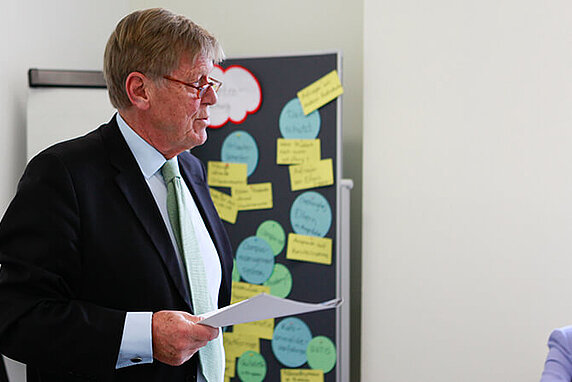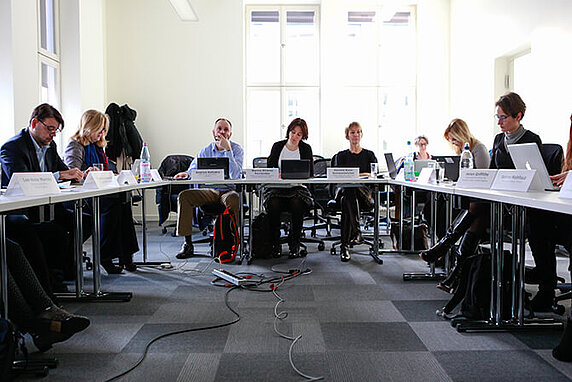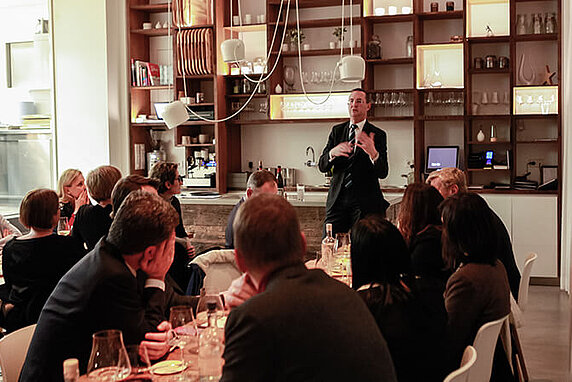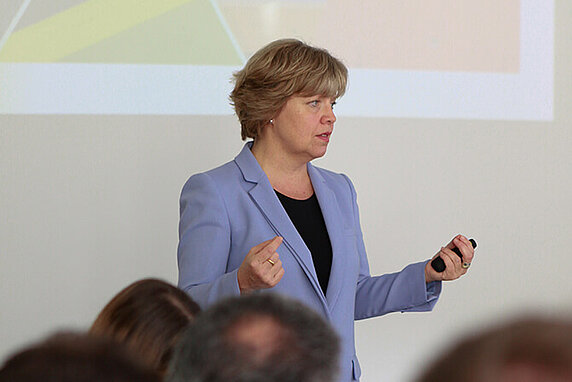CAPITALS programme brings together top civil servants and executives from across Europe.
In early February, the first cohort of 17 top-tier public policy and management executives got together at the Hertie School in Berlin for the last leg of an intensive programme on the inside workings of national public administrations. Participants exchanged experiences from each other’s administrations, traveling to four European capitals over the course of eight months.
The European CAPITALS programme, offered by the Hertie School (Berlin), the SciencesPo School of Public Affairs (Paris), the LUISS School of Government (Rome) and the Policy Institute at King‘s College (London), gives participants an opportunity to share insights and gather new ideas from renowned academics and practitioners. The underlying aim is to foster stronger ties among European countries, including the Brexit-bound UK and those outside the European Union. It is supported by the Mercator Foundation.
“Building Europe is what this programme is about,” said Andrea Roemmele, Academic Director of Executive Education and Professor for Communication in Politics and Civil Society at the Hertie School. “There couldn’t be a better time to bring together public servants to gain an understanding of the machineries of governance in other countries, to get to know their counterparts and make a contribution to growing Europe.”
In a time of relative uncertainty for the European project, intergovernmental cooperation is an area of rising importance, according to the programme's organisers. Top-level civil servants will need a deeper understanding of other countries' leadership and management processes and the ways in which governments function. Most currently lack familiarity with the policy conversations and cultures of their neighbours, resulting isolation, a lack of cross-country fertilisation, and obstacles to European coordination, according to both organisers and participants.
"What I found most interesting were the practical aspects of how policy is made - the articulation between political agenda, political decisions and administrative work. This is organised differently in every country," said one participant from the French Ministry of Labour. "In the broader perspective, it was also interesting to see what kinds of issues are discussed in different countries. In France right now, for example, we are thinking about reforms - administrative reforms - and the discussions we had with the permanent secretaries in the UK were very interesting. Here in Germany, we had discussions about state secretaries who coordinate the work in ministries - there is no equivalent in France, not really."
The three-day modules took place in Paris, London, Rome and Berlin in June, September, December and February, respectively. Each module devotes the first day to discussing the machineries of government, focusing on policy formulation and delivery; the second day to a policy lab for exploring policy challenges; and the third day to leadership and management experience.
Courses in Berlin included one on the salient features of governance and government in Germany, taught by Jobst Fiedler, Senior Fellow at the Hertie School, as well as a unit on public management reform in Germany from a comparative European perspective and one on digital governance, taught by Gerhard Hammerschmid, Professor of Public Management at the Hertie School.
In addition, there were talks with officials from the Chancellery and the Foreign Ministry as well as keynote speeches by Member of Parliament Danyal Bayaz and Stéphane Beemelmans, Managing director of Partnerschaften Deutschland and former State Secretary in the Federal Ministry of Defence.
Policy lab sessions on crucial European challenges such as digitalisation, metropolisation and taxation were held at all locations. Professor of Economics and Public Management Jean Pisani-Ferry facilitated these sessions, which also featured inputs from participants' working groups.
The programme was open to national civil servants and those from European institutions who aspire to DG-level positions, senior diplomats from EU member states and other countries, and executives from private organisations, business associations and NGOs. Participants in Berlin said they were fascinated to learn how different the systems in other countries were, despite similar policy issues.
"I know my civil service, and you assume that everyone else's civil service works in much the same way," said one participant who is currently assigned to the UK Department of Exiting the European Union. "But it turns out that it doesn't. So for example in France, it was interesting to find out how they work alongside political appointments. It gives us an opportunity to reflect a bit, to think about whether there are things we could do differently."
After eight months of getting to know each other and gaining a deeper familiarity with policy culture and conversations in each other's countries, participants said they were eager to continue that conversation. Some are already considering creating an alumni group that would meet once a year.
"We should try and set up some sort of annual meetup in the cohort, and perhaps give talks in different countries," said the UK participant. Representatives of the schools said they would also consider involving alumni in possible subsequent offerings of the programme in order to grow the network and bring participants even closer together over time.
For more information about our Executive Education programme: https://www.hertie-school.org/executive/






